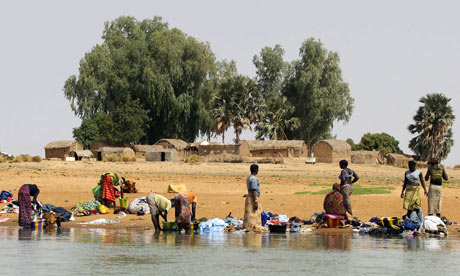CLICK HERE TO VIEW THIS ON FOREIGN POLICY
Posted By Colum Lynch  Wednesday, February 2, 2011 - 7:33 PM
Wednesday, February 2, 2011 - 7:33 PM
U.N. Secretary General Ban Ki-moon condemned today's attacks by pro-government mobs on peaceful Egyptian protesters as "unacceptable," called on security forces and demonstrators to show restraint and warned that the world should "not underestimate the danger of instability across the Middle East."
Ban's remarks, made to reporters following a meeting in London with British Prime Minister David Cameron, came one day after the U.N.'s high commissioner for human rights, Navi Pillay, urged the Egyptians authorities to "avoid excessive use of force" against "peaceful" demonstrators. The Geneva-based rights advocate also called for investigations into the police's handling of the crisis, and criticized Egyptian President Hosni Mubarak's government for demonstrating through 30 years of iron-fisted rule that "human rights have not been one of its prime concerns."
The combined remarks of the top U.N. officials marked an escalation in the organization's criticism of President Mubarak's handling of the current crisis, and offered moral support for the protesters who came under attack by Mubarak's loyalists. While Ban and Pillay stopped short of calling on Mubarak to step down, their remarks constituted an extraordinary public rebuke of the leader of a country that wields enormous political influence and power in the United Nations.
But the tough talk masked an essentially tentative substantive approach by the U.N. leadership to the popular uprisings sweeping across Egypt, Tunisia, Yemen and the broader Arab world. After six weeks of near-daily protests in the region, Ban has still not yet convened his top advisors for a major strategy session on the crisis.
U.N. policy advisors, unlike their counterparts in Washington, have not met with Middle East experts to discuss the crisis. Only on Tuesday did the U.N.'s top communications officials meet with the organization's senior political advisors for the first time.
In the meantime, Ban's chief of staff, Vijay Nambiar, and other top U.N. political advisors have counseled a cautious approach to the crisis, arguing in closed door meetings that it would not be appropriate for the United Nations to initiate bold ideas or proposals in an effort to shape the outcome of events or to be seen taking sides in a fluid political crisis whose outcome remains unclear. These officials maintain that the U.N. can only maintain its relevance over the medium- and long-term if it scrupulously avoids taking sides in the region. The most that Ban and other select officials should be doing, according to these officials, is offer broad public statements that endorse basic human rights.
Nambiar's approach has frustrated other U.N. officials, particularly within the communications division, who have been pressing for a tougher response to Mubarak's rule, and counseling the U.N. leadership to more closely align itself with the protesters. The U.N., they argue, needs to be positioned on what they see as the right side of history if or when Mubarak and other Arab autocrats fall.
Critics within the organization say that the U.N. leadership's caution is fueled by a fear of undertaking a politically risky initiative in a year when Ban is seeking reelection for a second term. They also note that the U.N. is concerned about upsetting other Middle East governments, including Saudi Arabia, which staunchly support Mubarak.
A deeper problem, they note, is that the U.N. lacks the intellectual expertise. None of the senior advisors in Ban's office are Arabic speaking, and none of the five top key policy makers in the Department of Political Affairs, which is taking the lead in fashioning the U.N. response, speak Arabic.
"These guys want to wait and see how this shakes out. They are not willing to stick their necks out because they don't know where this will end up, and they don't want to piss anybody off, particularly in an election year," one U.N. official said of Ban's top advisors. "If we were serious we would at least be briefing senior staff members on the crisis, hosting a panel of wise men, or bringing in experts from DC or from New York's foreign policy community. We're not doing that."
Ban's defenders say that the perception of U.N. inaction has been driven more by the fact that Ban has been traveling abroad, where he has been closely monitoring events in the Middle East and consulting with top regional representatives and advisors accompanying him on the trip. They say many of his critics in New York are not privy to those discussions.
U.N. officials also say that, even in the absence of a broadly coordinated strategy, there have been a number of individual initiatives from the organization in response to the crisis, including an offer to provide electoral assistance to Tunisia.
Follow me on Twitter @columlynch

















































